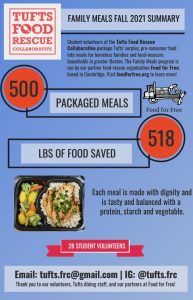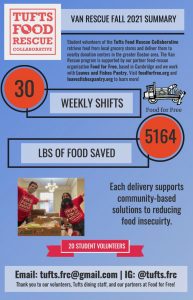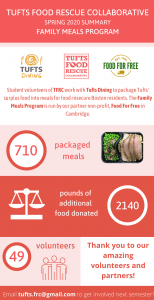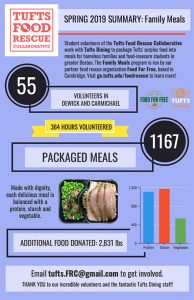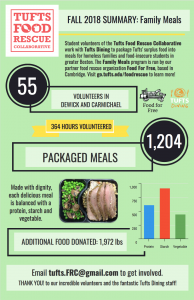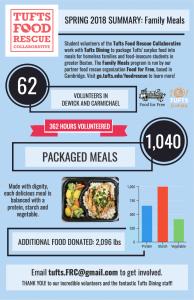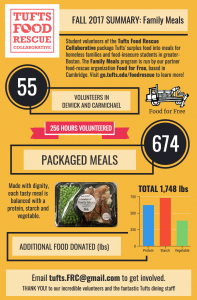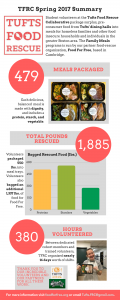TFRC Principles and Impact
Principles
The Tufts Food Rescue Collaborative is a multifaceted organization that acts on campus with Dining Hall Food Rescue and Off-Campus Van Rescue to reduce food insecurity in our area. Members of the TFRC uphold the 6 principles laid out in our constitution:
- Food Recovery. Through food rescue efforts, both in food retailers and campus dining halls, TFRC is committed to addressing issues of food surplus and food insecurity in our surrounding communities.
- Education and Outreach. TFRC aims to educate students and community members about injustices within the food system, empowering them to think critically about excess and insecurity.
- Sustainability. TFRC will work to ensure that our programs and actions can be sustained by future student and community partners.
- Collaborative Action. TFRC is committed to developing cohesion, cooperation, and community between the Tufts campus and actors in the wider Boston area in the pursuit of food justice.
- Community Engagement. TFRC will hear, support, and amplify the needs of our surrounding communities through discussion and coordinated action.
- Adaptability. TFRC recognizes that the food rescue movement is always changing, and we are prepared to adapt our activism to better sustain the movement.
Impact
Student volunteers typically package over a thousand meals each semester for Food For Free’s Heat-N-Eats program, as well as redirecting bulk amounts of other foods that are frozen for later use. (See infographics below) Volunteers with LCS Food Rescue pick up and redistribute hundreds of pounds of edible food from supermarkets every week.
This rescued food reflects two different challenges in large-scale institutional and commercial food supply streams.
- The Heat-N-Eats program makes use of prepared foods from Tufts Dining that haven’t yet been put out for service in the dining halls. These “leftovers” aren’t usually in large enough quantities to be used for future meals, since Tufts Dining operates at the scale of around 10,000 meals each day.
- Supermarkets typically donate food that is nearing its “sell by” date (whether or not that affects its quality – learn more here), produce that is past its peak freshness, or simply food that must be moved in order to accommodate new stock.
At the same time, large numbers of people in our community struggle to afford food reliably, especially fresh produce and proteins.
Food rescue does not solve the underlying problems of poverty, surplus food production, or incommensurate scales that lead to both waste and want in our food system. But it helps make use of some of the safe, edible food that would otherwise be composted or thrown away each day. Alongside these hands-on efforts, volunteers involved in food rescue at Tufts are working to understand the underlying problems and support projects that address them both on and off our campus.
